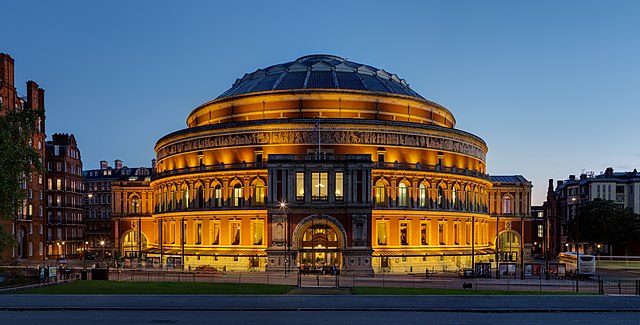Top Qs
Timeline
Chat
Perspective
Eurovision Song Contest 1968
International song competition From Wikipedia, the free encyclopedia
Remove ads
The Eurovision Song Contest 1968 was the 13th edition of the Eurovision Song Contest, held on 6 April 1968 at the Royal Albert Hall in London, United Kingdom, and presented by Katie Boyle. It was organised by the European Broadcasting Union (EBU) and host broadcaster the British Broadcasting Corporation (BBC), who staged the event after winning the 1967 contest for the United Kingdom with the song "Puppet on a String" by Sandie Shaw. Despite being the UK's first win at the contest, it was actually the third time that the BBC had hosted the competition, having previously done so in 1960 and 1963, both of which also took place in London and were presented by Katie Boyle. It was the first time the event was broadcast in colour. Broadcasters from seventeen countries participated in the contest, the same countries that had participated the previous year.
The winner was Spain with the song "La La La" by Massiel, and written/composed by Manuel de la Calva and Ramón Arcusa. This was Spain's first victory - and their first ever top five placing - in the contest.
Remove ads
Location

The British Broadcasting Corporation (BBC) staged the 1968 contest in London, after winning the 1967 contest for the United Kingdom with the song "Puppet on a String" by Sandie Shaw. The venue selected was the Royal Albert Hall. This concert hall is known for hosting the world's leading artists from several performance genres, sports, award ceremonies, the annual summer Proms concerts and other events since its opening in 1871, and has become one of the United Kingdom's most treasured and distinctive buildings. At the time of the contest in 1968, the venue had a capacity of 7,000 seats.[1]
Remove ads
Participants
Summarize
Perspective
This section contains numerous links to pages on foreign language Wikipedias. They are shown as red links with the language codes in (small blue letters) in parentheses. Select the language code to open the page in that language. |
Broadcasters from seventeen countries participated in the 1968 contest, the same countries that had participated in 1967.[2]
The contest featured one representative who had previously performed as lead artists for the same country. Isabelle Aubret had won Eurovision for France in 1962.
Originally Spanish broadcaster Televisión Española (TVE) entered Joan Manuel Serrat to sing "La La La", but after he demanded to sing the song in Catalan at the contest, Massiel, who was on tour in Mexico, was brought in as a late replacement. In just two weeks, she had to rush back to Spain, learn the song, record it in several languages, travel to Paris to get a dress and go to London for rehearsals. She sang the song in the contest in Spanish with a new arrangement made to fit her. In her winning reprise, she performed part of her song in English, in addition to the original version, becoming the first winner to do so.[2][3] The Norwegian national selection, Melodi Grand Prix 1968, ended with the song "Jeg har aldri vært så glad i noen som deg" winning performed by both Kirsti Sparboe and Odd Børre. However the composer, Kari Diesen withdrew the song due to receiving multiple accusations of plagiarism of the song "Summer Holiday" by Cliff Richard.[4][5] Norsk rikskringkasting (NRK) internally selected the runner-up song in the selection, "Stress" to participate in the contest instead, and Odd Børre was chosen as the singer.
Remove ads
Format
1968 was the first time that the Eurovision Song Contest was broadcast in colour.[1] The countries that broadcast it in colour were France, Germany, the Netherlands, Norway, Switzerland, Sweden and the United Kingdom, although in the UK it was broadcast as an encore presentation in colour on BBC Two the next day. Many Eastern European countries as well as Tunisia broadcast the contest.
Prior to the contest, the bookmakers were sure of another British victory, as the English singer Cliff Richard, who was already dominating the music charts at that time, was hotly tipped as the favourite to win, but in the end he lost out to Spain's song by a margin of just one vote.
Contest overview
Summarize
Perspective
Spokespersons
Each participating broadcaster appointed a spokesperson who was responsible for announcing the votes for its respective country via telephone. Known spokespersons at the 1968 contest are listed below.
Remove ads
Detailed voting results
Due to a misunderstanding by the hostess, Katie Boyle, Switzerland was erroneously awarded 3 votes by Yugoslavia, instead of 2. The scrutineer asked for the Yugoslav votes to be announced a second time.
Remove ads
Broadcasts
Summarize
Perspective
Each participating broadcaster was required to relay the contest via its networks. Non-participating EBU member broadcasters were also able to relay the contest as "passive participants". Broadcasters were able to send commentators to provide coverage of the contest in their own native language and to relay information about the artists and songs to their television viewers.[15] In addition to the participating countries, the contest was also reportedly broadcast in Tunisia, and in Bulgaria, Czechoslovakia, East Germany, Hungary, Poland, Romania and the Soviet Union via Intervision, with an estimated global audience of between 150 and 200 million.[16][17][18]
Known details on the broadcasts in each country, including the specific broadcasting stations and commentators are shown in the tables below.
Remove ads
Notes
References
External links
Wikiwand - on
Seamless Wikipedia browsing. On steroids.
Remove ads


